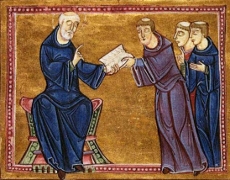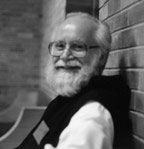Lectio Divina as School of Prayer
Since it is generally admitted in our days, that lectio divina can have as its object not only Scripture but also the Fathers of the Church and, for monks and nuns, in particular the Fathers of monasticism, I will allow myself a reflection on this also.
 Monastic tradition, being a lived interpretation of the Word of God, has an importance similar to it, although secondary to it. (We have seen, moreover, how the Fathers of the Desert tended to give the same power to the Word or example of an Ancient transformed by the Spirit as to the Word of God or an example from the Bible. But this lived word which is the monastic tradition also needs to be continually interpreted and re-interpreted.
Monastic tradition, being a lived interpretation of the Word of God, has an importance similar to it, although secondary to it. (We have seen, moreover, how the Fathers of the Desert tended to give the same power to the Word or example of an Ancient transformed by the Spirit as to the Word of God or an example from the Bible. But this lived word which is the monastic tradition also needs to be continually interpreted and re-interpreted.
In our days the Fathers have been re-discovered in monastic communities. And we should praise this re-discovery. But their message, even more than that of the Scriptures, is shrouded in a given culture which is not, as is too often assumed, the monastic culture — as if there were only one — but rather the cultural context of such or such a particular epoch in which the ancient monks lived their monastic vocation. The modern reader must expose himself/herself without any critical mind set to the transforming force of the grace which they lived and which they convey; but he/she can only do this after having peeled off, with a very fine critical sensitivity, the cultural shroud under which this precious nourishment is hidden.
Just as there does not exist one Christian culture, parallel to all the profane cultures, but many local cultures that have been Christianized, – and these in differing degrees; in the same way, there does not exist one monastic culture, but many diverse cultures transformed by their encounter with the monastic charism. The use of the Fathers as matter for lectio divina requires a serious work of exegesis and study to recapture the reality which they lived beyond the cultural shroud. Otherwise, one reads oneself into the texts one admires, and, obviously, the more one finds oneself there the more one admires them.
The monk of today will be challenged, called to conversion, transformed, by reading the Fathers of monasticism, solely on condition that he allows himself to be touched by them in all the aspects of his monastic experience. And that will only come about in the measure in which he unites himself to them in the whole of their experience: which presupposes a detailed analysis of their language and of their manner of speaking, of their thought, both philosophical and theological, of the cultural context in which they lived. It seems to me artificial and even perilous to distinguish this study from lectio properly so called, as if it were only a prelude.
The monk of today necessarily belongs to a definite culture, and to a local Church, therefore to a definite Christian culture. This is the culture which, in him, meets the monastic tradition and must let itself be challenged and transformed by it. I am afraid that, too often, in our approach to the Fathers, we push the young to put on like a garment the monastic culture of a past epoch, at the risk of transforming our monasteries into cultural refugee camps.
The Fathers of the Desert remind us of the primordial importance of Scripture in the life of the Christian and the necessity of letting ourselves be constantly transformed in the crucible of the Word of God.
Moreover, even such a rapid study as we have made of the way in which they approached Scripture, of its very nature makes us call into question certain aspects of the modern conception of lectio divina, or more precisely, calls us to go beyond them to arrive at a deeper understanding of the unity of their lived experience. The monk, more than anyone else, cannot allow himself to be divided. His very name, monachos, reminds him unceasingly of the unity of preoccupation, of aspiration and of attitude proper to the man or woman who has chosen to live one sole love with an undivided heart.
Rome, November 7, 1995.
 Armand Veilleux, OCSO
Armand Veilleux, OCSO
Note: Several of the quotes from the ancient monastic authors, in this conferences, were borrowed from: Louis Leloir, ALectio Divina and the Desert Fathers@, Liturgy, Vol. 23, n. 2, 1989, pp. 3-38. Shorter version of the same: AL’Écriture et les Pères@, Revue d’Ascétique et de Mystique 47 (1971), pp. 183-199.

Leave a Reply